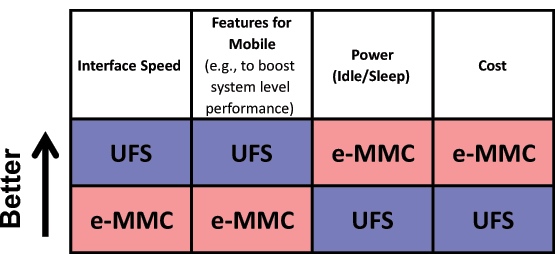Toshiba Ushers in UFS
Compares and contrasts to e-MMC.
This is a Press Release edited by StorageNewsletter.com on November 14, 2013 at 3:57 pmToshiba America Electronic Components, Inc. (TAEC) shares with designers what they need to know when it comes to choosing an embedded memory device for mobile applications.
e-MMC continues to be the solution of choice, offering gigabyte storage, low power, an attractive cost/performance ratio, and broad industry interface support.
Universal Flash Storage (UFS) is the next generation of embedded memory device to e-MMC, driving a boost in performance.
Toshiba has achieved milestones. For example, the company recently announced its new embedded NAND flash memory modules featuring 19nm second generation process technology. In a new video, the second in a solution series that takes viewers inside memory design issues with straight talk from Toshiba’s memory experts, Scott Beekman, director of managed NAND memory products for TAEC, explores the differences between e-MMC and UFS.
e-MMC has been adopted by numerous applications including smartphones, tablets, games, servers, printers, and many more. e-MMC supports half duplexing, allowing either reading or writing, but not both to occur between the host processor and an e-MMC device and supports an interface speed of up to 400MB/s for JEDEC standard Version 5.0.
UFS has a faster interface than e-MMC and more features to enhance overall system performance – with its key benefit being a boost in performance. It supports duplexing, allowing both reading and writing to occur between the host processor and the UFS device at the same time, and supports an interface speed of up to 720MB/s initially, with faster interfaces soon to follow.
“The sheer momentum of e-MMC in the market will likely mean that these two solutions will continue to exist in parallel for some time, with UFS initially supporting the needs of applications demanding higher performance, and typically at higher densities, and e-MMC supporting the needs of applications driven to maintain the lowest cost,” Beekman noted. “Toshiba has been a leader in e-MMC from the beginning, and we will continue to innovate with both e-MMC and UFS as we look to the future.”














 Subscribe to our free daily newsletter
Subscribe to our free daily newsletter

